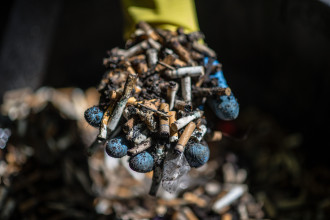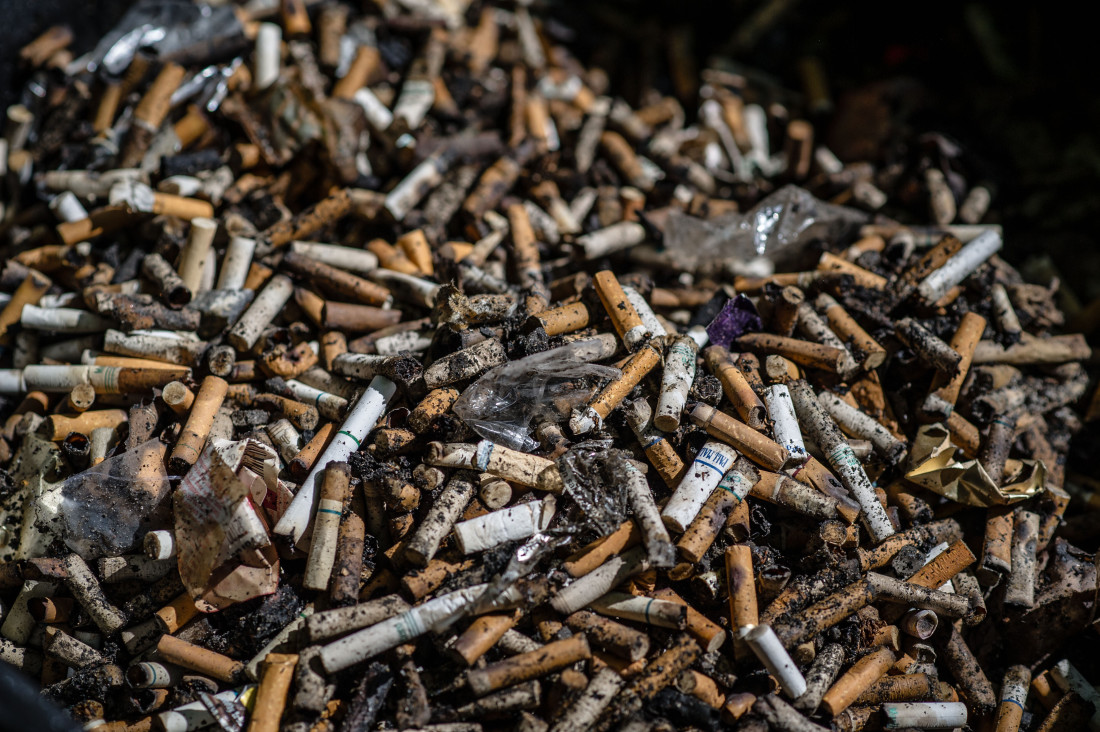Even though his organization is called Friends Against Butts, make no mistake, Rowdy Keelor wants your butts. Cigarette butts, that is.
Keelor, an Asheville environmentalist and host of Asheville FM’s “Best Day Ever,” founded the venture with three other people earlier this year with a goal of recycling as many cigarette butts as possible, pieces of litter that often wind up in rivers, streams, roadways and sidewalks. The nonprofit collects the waste from a dozen businesses around the city and mails them to TerraCycle, a New Jersey-based company that recycles them into mostly industrial applications — railroad ties, plastic shipping pallets and building applications.
Friends Against Butts receives a shipping label from Terracycle and $1 per pound bounty for the trash, which enables them to cover operating costs in collecting more trash. So far, they’ve recycled about 100 pounds of butts, and they’re looking to soon partner with the city in collecting cigarette butts for recycling.
“We’re looking to sign an agreement that will be completed in the near future,” said Richard Grant, solid waste services manager for the city of Asheville.
Grant said there are 163 city-owned cigarette receptacles that piggyback onto garbage cans in the downtown and central business district areas. In the agreement, the city will sort the cigarette butts from the receptacles and place them into larger receptacles at trash headquarters that Friends Against Butts will provide. They will then be sent to TerraCycle by the organization.
“I can’t guess how many pounds of cigarette butts are collected by the city each week, but it’s a lot,” said Grant. “Anything that we can remove from the waste stream [with] recycling is a big deal.”
Keelor said even though the effort involves a lot of hard work in collecting, sorting, and mailing some very stinky cigarette butts, some of the hardest work is psychological.
“Our goal is to make people think of cigarette butts as recyclable, not as garbage,” he said. “And we have to do this without advocating cigarette smoking in any way.”

According to TerraCycle’s global vice president of communications, Albe Zakes, cigarette butts are the most littered item in the world, at 3.5 trillion pieces per year worldwide. He cites Keep America Beautiful’s figure that 38 percent of all litter in America is tobacco related, from the packaging, to tobacco tins, to the actual butts.
“You might think of a cigarette’s filter as a fabric, but it’s actually a form of plastic-cellulose acetate,” said Zakes. “This can be recycled into any number of things.”
TerraCycle, founded in 2002, receives about 30 million cigarette butts per year to recycle (as well as other recyclable items such as snack chip bags) from thousands of people involved in the program worldwide. The butts are shredded, with the organic paper, tobacco and ash separated from the filter.
The organic materials are composted, while the plastic is pelletized and recycled into industrial materials. While the resulting plastic pellet is 100 percent clean and could be used for anything, consumer applications are avoided because of the stigma attached with cigarettes.
“We remove 100 percent of the carcinogens, but the stigma of cigarettes is hard to avoid, so for now, it’s industrial only,” said Zakes.
He stresses that anyone can get involved in sending TerraCycle items previously thought non-recyclable.
“We’d love to get more people to do this. We’re looking at partnering with airports, sports stadiums and other large venues,” said Zakes.
The expansion plan for Friends Against Butts is to collect the trash from outlying counties, as well as festivals such as Burning Can and the Mountain Music Fest.
“We’re accepting volunteers for help,” said Keelor. “We’d love to work with every environmental organization that’s interested.”




Before you comment
The comments section is here to provide a platform for civil dialogue on the issues we face together as a local community. Xpress is committed to offering this platform for all voices, but when the tone of the discussion gets nasty or strays off topic, we believe many people choose not to participate. Xpress editors are determined to moderate comments to ensure a constructive interchange is maintained. All comments judged not to be in keeping with the spirit of civil discourse will be removed and repeat violators will be banned. See here for our terms of service. Thank you for being part of this effort to promote respectful discussion.